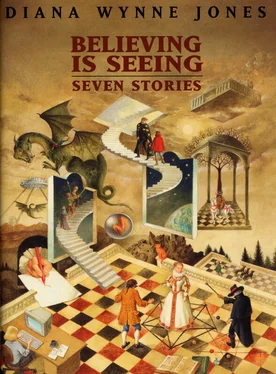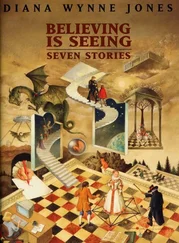But Imperion swept on, causing the watery deities gathered there to steam and hiss, and arrived in a wave of heat and warm water at the foot of Zond’s high throne.
“Father!” Imperion cried urgently.
A high god like Imperion was entitled to call Zond Father. Zond did not recall whether or not he was actually Imperion’s father. The origins of the gods were not quite so orderly as their present existence. But Zond knew that, son of his or not, Imperion had breached all the rules. “Abase yourself,” Zond said sternly.
Imperion ignored this command, too. Perhaps this was just as well, since the floor of Heaven was awash already, and steaming. Imperion kept his flaming gaze on Zond. “Father! The Sage of Dissolution has been born!”
Zond shuddered in the clouds of hot vapor and tried to feel resigned. “It is written,” he said, “a Sage shall be born who shall question everything. His questions shall bring down the exquisite order of Heaven and cast all the gods into disorder. It is also written—” Here Zond realized that Imperion had made him break the rules, too. The correct procedure was for Zond to summon the god of prophecy and have that god consult the Book of Heaven. Then he realized that Imperion was the god of prophecy. It was one of his precisely allocated duties. Zond rounded on Imperion. “What do you mean coming and telling me? You’re god of prophecy! Go and look in the Book of Heaven!”
“I already have, Father,” said Imperion. “I find I prophesied the coming of the Sage of Dissolution when the gods first began. It is written that the Sage shall be born and that I shall not know.”
“Then,” said Zond, scoring a point, “how is it you’re here telling me he has been born?”
“The mere fact,” Imperion said, “that I can come here and interrupt the Water Festival shows that the Sage has been born. Our Dissolution has obviously begun.”
There was a splash of consternation among the watery gods. They were gathered down the hall as far as they could get from Imperion, but they had all heard. Zond tried to gather his wits. What with the steam raised by Imperion and the spume of dismay thrown out by the rest, the halls of Heaven were in a state nearer chaos than he had known for millennia. Any more of this, and there would be no need for the Sage to ask questions. “Leave us,” Zond said to the watery gods. “Events even beyond my control cause this festival to be stopped. You will be informed later of any decision I make.” To Zond’s dismay, the watery ones hesitated—further evidence of Dissolution. “I promise,” he said.
The watery ones made up their minds. They left in waves, all except one. This one was Ock, god of all oceans. Ock was equal in status to Imperion, and heat did not threaten him. He stayed where he was.
Zond was not pleased. Ock, it always seemed to him, was the least orderly of the gods. He did not know his place. He was as restless and unfathomable as mankind. But, with Dissolution already begun, what could Zond do? “You have our permission to stay,” he said graciously to Ock, and to Imperion: “Well, how did you know the Sage was born?”
“I was consulting the Book of Heaven on another matter,” said Imperion, “and the page opened at my prophecy concerning the Sage of Dissolution. Since it said that I would not know the day and hour when the Sage was born, it followed that he has already been born, or I would not have known. The rest of the prophecy was commendably precise, however. Twenty years from now, he will start questioning Heaven. What shall we do to stop him?”
“I don’t see what we can do,” Zond said hopelessly. “A prophecy is a prophecy.”
“But we must do something!” brazed Imperion. “I insist! I am a god of order, even more than you are. Think what would happen if the sun went inaccurate! This means more to me than anyone. I want the Sage of Dissolution found and killed before he can ask questions.”
Zond was shocked. “I can’t do that! If the prophecy says he has to ask questions, then he has to ask them.”
Here Ock approached. “Every prophecy has a loophole,” he said.
“Of course,” snapped Imperion. “I can see the loophole as well as you. I’m taking advantage of the disorder caused by the birth of the Sage to ask Great Zond to kill him and overthrow the prophecy. Thus restoring order.”
“Logic chopping is not what I meant,” said Ock.
The two gods faced one another. Steam from Ock suffused Imperion and then rained back on Ock, as regularly as breathing. “What did you mean, then?” said Imperion.
“The prophecy,” said Ock, “does not appear to say which world the Sage will ask his questions in. There are many other worlds. Mankind calls them if-worlds, meaning that they were once the same world as Theare, but split off and went their own ways after each doubtful event in history. Each if-world has its own Heaven. There must be one world in which the gods are not as orderly as we are here. Let the Sage be put in that world. Let him ask his predestined questions there.”
“Good idea!” Zond clapped his hands in relief, causing untoward tempests in all Theare. “Agreed, Imperion?”
“Yes,” said Imperion. He flamed with relief. And being unguarded, he at once became prophetic. “But I must warn you,” he said, “that strange things happen when destiny is tampered with.”
“Strange things maybe, but never disorderly,” Zond asserted. He called the watery gods back and, with them, every god in Theare. He told them that an infant had just been born who was destined to spread Dissolution, and he ordered each one of them to search the ends of the earth for this child. (“The ends of the earth” was a legal formula. Zond did not believe that Theare was flat. But the expression had been unchanged for centuries, just like the rest of Heaven. It meant “Look everywhere.”)
The whole of Heaven looked high and low. Nymphs and godlets scanned mountains, caves, and woods. Household gods peered into cradles. Watery gods searched beaches, banks, and margins. The goddess of love went deeply into her records, to find who the Sage’s parents might be. The invisible dragons swam to look inside barges and houseboats. Since there was a god for everything in Theare, nowhere was missed, nothing was omitted. Imperion searched harder than any, blazing into every nook and crevice on one side of the world, and exhorting the moon goddess to do the same on the other side.
And nobody found the Sage. There were one or two false alarms, such as when a household goddess reported an infant that never stopped crying. This baby, she said, was driving her up the wall, and if this was not Dissolution, she would like to know what was. There were also several reports of infants born with teeth, or six fingers, or suchlike strangeness. But in each case Zond was able to prove that the child had nothing to do with Dissolution. After a month it became clear that the infant Sage was not going to be found.
Imperion was in despair, for as he had told Zond, order meant more to him than to any other god. He became so worried that he was actually causing the sun to lose heat. At length the goddess of love advised him to go off and relax with a mortal woman before he brought about Dissolution himself. Imperion saw she was right. He went down to visit the human woman he had loved for some years. It was established custom for gods to love mortals. Some visited their loves in all sorts of fanciful shapes, and some had many loves at once. But Imperion was both honest and faithful. He never visited Nestara as anything but a handsome man, and he loved her devotedly. Three years ago she had borne him a son, whom Imperion loved almost as much as he loved Nestara. Before the Sage was born to trouble him, Imperion had been trying to bend the rules of Heaven a little, to get his son approved as a god, too.
Читать дальше












